Homemade Electrolyte Drink: 5 Easy Recipes
Author:
Reviewed by:
(Certified Nutritionist, S&C specialist, M.Sc.Eng. Biotechnology)
Unlock your full potential by engaging with our experts and community! Have questions about your fitness journey or looking for expert advice on weightlifting techniques? Don’t hesitate — leave a comment below and Camila Parente Santos will provide a personalized answer and insights to help you reach your goals.
Torokhtiy is reader-supported. Some links are affiliate links, and we may earn a commission at no extra cost to you. See our disclosure page for details.
While additional electrolyte supplementation is largely unnecessary for most people, it can be a handy way to make sure you’re hitting all your mineral targets for the day. In this article, we’ll be covering 4 electrolyte drink recipes you can make at home for a quick and easy boost of hydration.
Homemade Electrolyte Drinks: You can make homemade electrolyte drinks by simply combining ingredients naturally high in electrolytes. A great place to start is coconut water with dates and salt added, which provides a high amount of electrolytes perfect for rehydration.
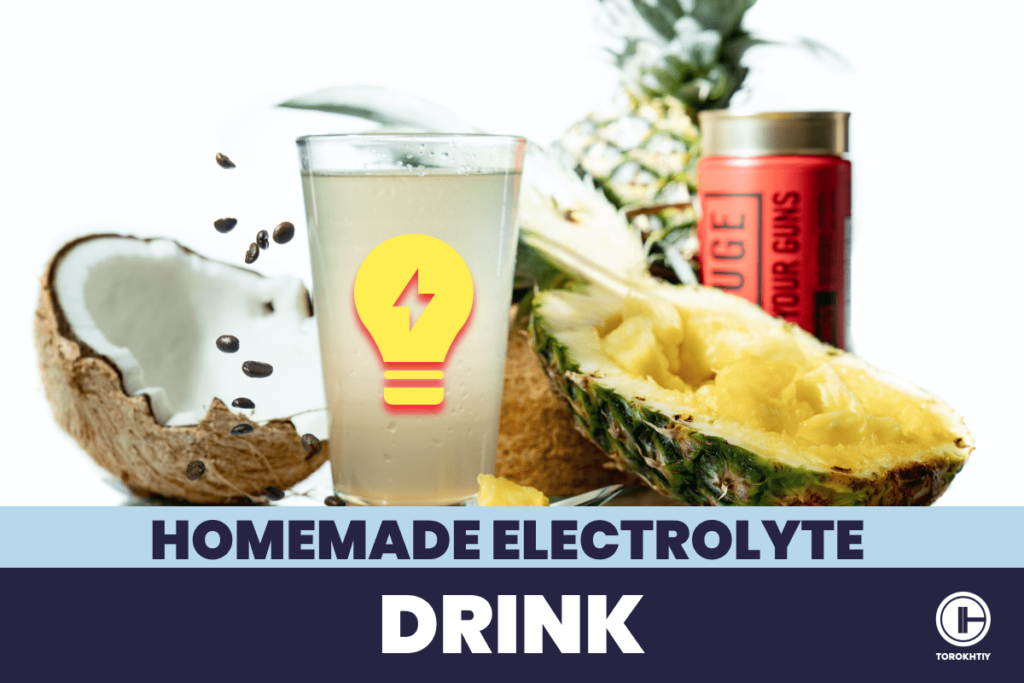
Electrolytes and their Role in the Body
Electrolytes are electrically charged minerals that all serve slightly different roles in the body. For example, sodium regulates fluid balance outside of cells, while potassium regulates it inside of cells, among other roles. Magnesium plays a role in heart and enzyme function, while calcium plays a role in bone health, nerve function, and more.
As you can see, each electrolyte is crucial in its own way. Below we’ll be going over some natural sources of electrolytes that we’ll be returning to later on with our homemade electrolyte drink recipes.
Natural Sources of Electrolytes
We’ll be taking a look at 6 main electrolytes including sodium, potassium, magnesium, calcium, chloride, and phosphates. We’ll be covering natural sources of all of these electrolytes so you can see if you’re already eating a diet rich in these electrolytes.
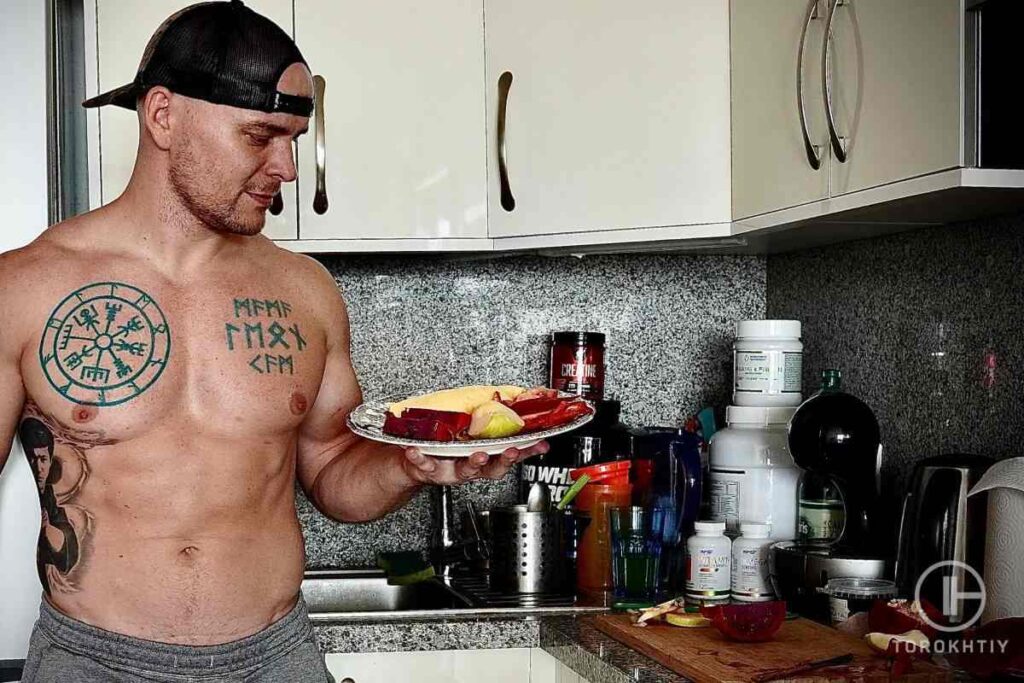
• Sodium
First and foremost is sodium, which is the electrolyte you lose the most of through sweat, and is arguably the most important electrolyte for hydration. While sodium is not naturally found in natural foods, it’s also likely the most over-consumed electrolyte on our list. But why is that?
Sodium is added in high quantities to almost all processed foods, meaning most diets high in processed foods will also be very high in sodium. This is why if you’re eating a primarily whole foods diet, it’s important to add a good amount of salt to your food to make sure you’re getting an adequate amount every day.
• Potassium
Next is potassium, which is also an important electrolyte for hydration. This is also the first electrolyte we’ll be covering that can be found in a plethora of natural food sources. These include:
- Fruits and Vegetables (Potatoes, Bananas, Avocados, Oranges)
- Beans & Lentils
- Dairy
- Nuts (Cashews, Almonds)
- Meat (Chicken, Salmon)
- Coconut Water
• Magnesium
Next, we have magnesium, which can also be found in a wide variety of foods, similar to potassium. The following foods are all great sources of magnesium, including:
- Nuts and Seeds (Almonds, Peanuts, Cashews, Pumpkin Seeds)
- Beans (Black, Kidney, Soybeans)
- Fruit (Bananas, Raisins)
- Vegetables (Spinach, Swiss Chard, Potatoes)
- Brown Rice
- Oatmeal
- Meat (Salmon, Beef Turkey)
- Coconut Water
As you can see, there is a good amount of overlap with foods rich in potassium, making these two electrolytes easy to prioritize alongside one another.
• Calcium
Next is calcium, which is commonly associated with bone health, although it also plays a role in heart health, nerve function, and more. It can be found in:
- Dairy (Milk, Yogurt, Cheese)
- Soy Products (Soybeans, Tofu, Soy Milk)
- Leafy Greens (Kale, Spinach, Bok Choy)
- Almonds
• Chloride and Phosphate
Finally, we have chloride and phosphate. Because chloride is a large part of table salt along with sodium (NaCl), you likely don’t need to worry about additional chloride, although it can be found in seafood. Phosphate (phosphorus), however, can be found in:
- Dairy (Milk, Yogurt, Cheese)
- Meat (Salmon, Beef, Poultry, Pork)
- Legumes, Nuts, & Seeds
5 Simple Homemade Electrolyte Drink Recipes
Below we’ll be showing you how to make an electrolyte drink using some of the natural electrolyte sources outlined above. We’ll be offering 5 different recipes that can be used for different purposes, let’s get into it!
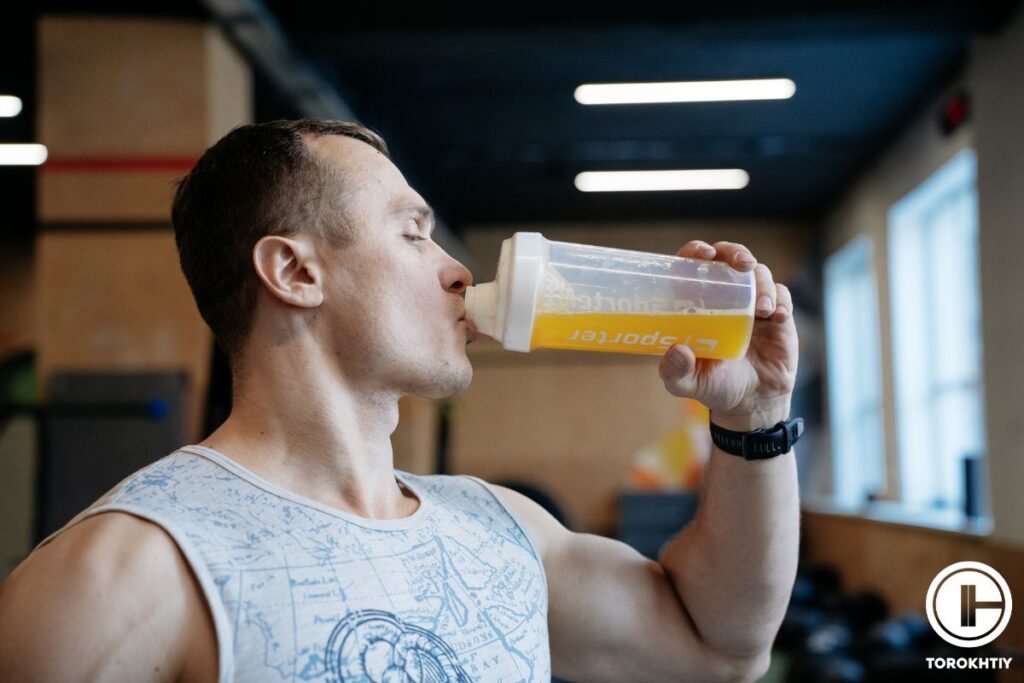
If you plan on using these drinks for rehydration for endurance competition, you may want to use slightly more sodium (0.5-0.7g of sodium per liter based on AIS recommendations). For recreational athletes and average people, we recommend using less sodium to make for a more palatable drink.
1. Highest in Electrolytes – Coconut Water & Date Based
First, this coconut water electrolyte drink is a great intra-workout drink for the combination of electrolytes and simple carbs. Coconut water and dates are both great sources of potassium and magnesium, with salt being added to this drink for some additional sodium. This along with the simple carbs from the dates make this an excellent homemade electrolyte drink for athletes who need some extra energy.
Ingredients (Makes ~4 Cups):
- 4 Cups (1 Liter) of Coconut Water
- 40g of Dates (~4-8 dates)
- ⅛-¼ tsp of Salt (adjust for flavor and electrolyte needs)
Instructions:
- Soak dates overnight to soften them before blending
- Blend ingredients together until consistency is smooth
- Adjust salt content for taste and electrolyte needs
2. Best Tasting – Water & Citrus Juice Based
While the recipe above is chocked full of electrolytes, the combination of coconut water, dates, and salt may not be for everyone. This next electrolyte drink recipe combines water, alongside citrus juice for potassium, salt for sodium, and sweetener for flavor and few extra minerals in case of honey.
While you will sacrifice some electrolyte content, this homemade electrolyte water will taste absolutely delicious.
Ingredients (Makes ~4 Cups):
- 4 Cups (1 Liter) of Water
- Juice of 1 Lemon
- 2 tbsp. of Sweetener (Honey, Maple Syrup, Sugar, Stevia etc.)
- ⅛-¼ tsp of Salt (adjust for flavor and electrolyte needs)
Instructions:
- Combine all ingredients
- Optional: Start with warm water first to better dissolve sweetener and salt
- Adjust salt, lemon juice, and sweetener for taste and electrolyte needs
3. Best With Caffeine – Green Tea & Coconut Water Based
For a drink that includes a solid hit of caffeine alongside electrolytes, consider including some green tea. Along with coconut water, citrus juice, and salt for electrolytes, green tea will provide a mild addition of caffeine perfect for use before a workout.
Ingredients (Makes ~4 Cups):
- 1 Cup of Green Tea
- 3 Cups of Coconut Water
- Juice of 1 Lemon
- 2 tbsp. of Sweetener (Honey, Maple Syrup, Sugar, Stevia etc.)
- ⅛-¼ tsp of Salt (adjust for flavor and electrolyte needs)
Instructions:
- Brew 1 cup of green tea, adding in sweetener and salt to dissolve smoothly
- Allow to cool in the fridge
- Combine with lemon juice and coconut water once cooled
- Adjust salt, lemon juice, and sweetener for taste and electrolyte needs
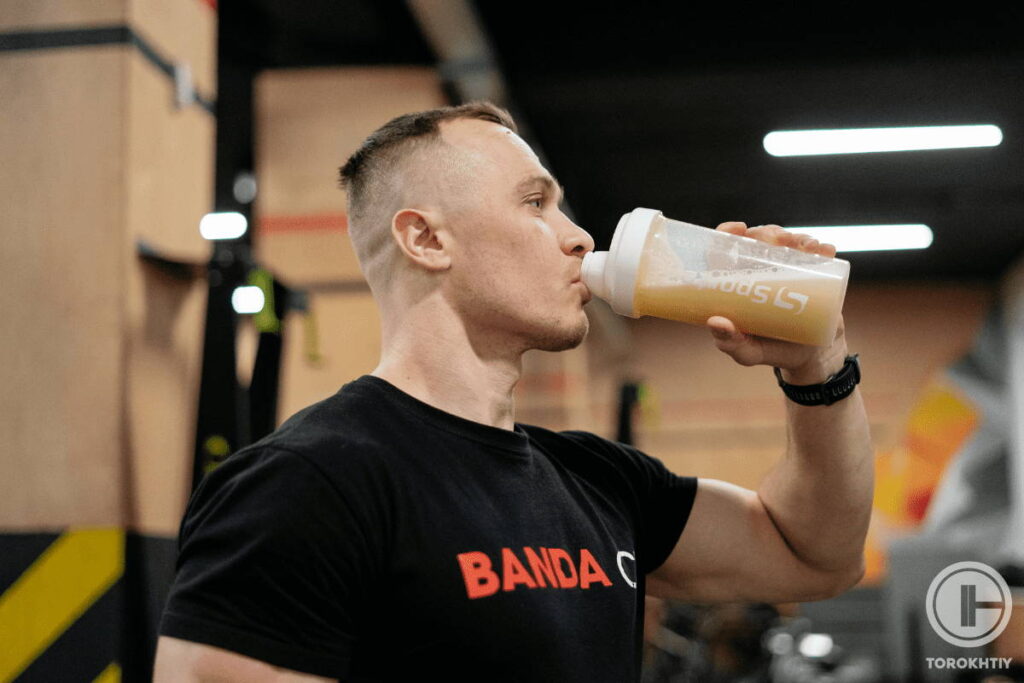
4. Best for Calcium & Protein – Milk, Banana, & Cocoa Based
While the 3 DIY electrolyte drinks above have solid amounts of sodium, potassium, and magnesium, they are all lacking in calcium and protein. If you want to prioritize both calcium and protein, consider this recipe that combines milk with electrolyte-rich fruits and veggies, making for a perfect post-workout drink.
You’ll be getting all the calcium, potassium, and magnesium from milk, as well as added potassium from the banana, and magnesium from the cocoa powder. For an added boost of healthy fats and even more magnesium, consider adding some peanut butter. And while protein powder doesn’t contain many electrolytes, it’s a great way to boost the protein content of this shake.
It’s also worth noting that this is our only recipe that doesn’t include any added sodium. Although there is some sodium in milk and peanut butter, it’s not a significant amount.
While you could add some salt to this drink and it can make it even tastier, it would likely ruin the flavor if you add too much. So, just keep in mind that this drink is prioritizing calcium and protein, and likely won’t be the best option for rehydration.
Ingredients (Makes ~3 Cups):
- 2 Cups of Milk
- 1 Banana
- 1tbsp of Cocoa Powder
- Optional: 1 tbsp of Peanut Butter
- Optional: 1 Scoop of Whey Protein
Instructions:
- Combine ingredients together and blend until smooth
5. Easiest to Measure – Electrolyte Supplement & Water
Finally, while this may not exactly be “DIY electrolyte powder”, using an electrolyte supplement is one of the easiest ways to know exactly how many electrolytes you’re getting. This is ideal especially if you’re an athlete who wants more control over hydration before, during, or after a workout.
We recommend using a high-quality supplement like Transparent Labs Hydrate, which we’ll be covering in more depth below. With this supplement specifically, we recommend mixing at a ratio of 1 serving per liter to stay in the AIS recommended range of 0.5-0.7g of sodium per liter, but feel free to adjust based on your own needs and preferences.
Ingredients (Makes 4 Cups):
- 1 Liter of Water
- 1 Scoop of Transparent Labs Hydrate (or Other Electrolyte Powder)
Instructions:
- Stir or shake water and electrolyte powder together
How to Choose the Right Mix?
Choosing which of these recipes is right for you depends on several factors, including your goals and when you plan on using them. We’ll also be going over some risks associated with electrolyte supplementation so you can decide if it’s necessary for you.
1. Electrolytes – Why and When? Goals.
First, we mainly recommend electrolyte supplementation if you’re a serious endurance athlete. This is because you need to be replenishing the electrolytes lost during exercise. Otherwise, electrolyte supplementation is likely overkill. As a result, we only recommend high-sodium electrolyte drinks to athletes who actually need them.
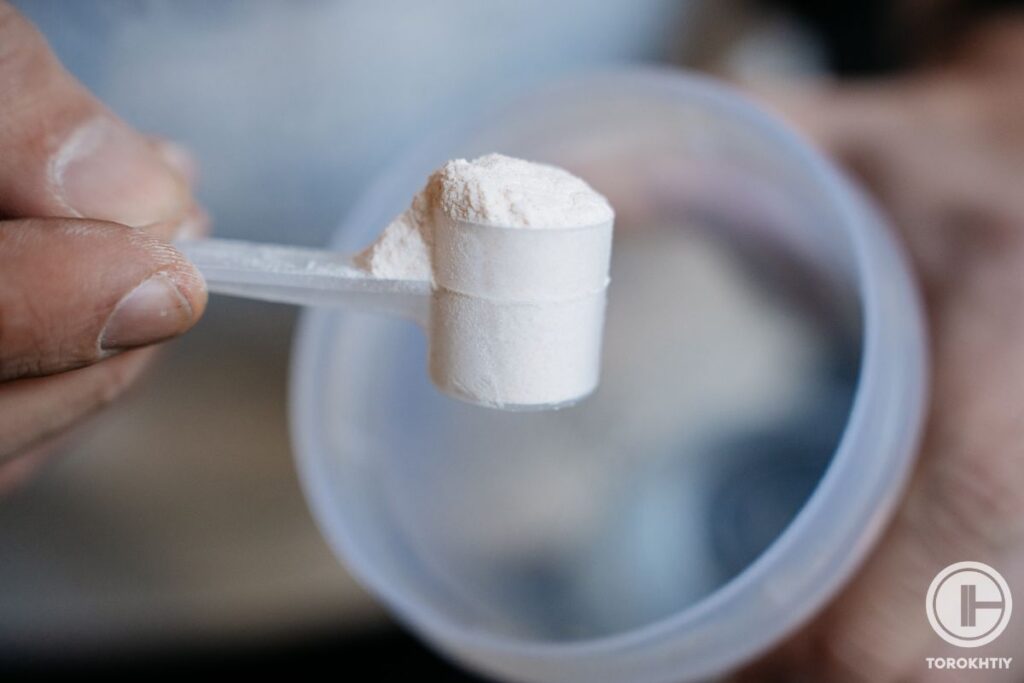
In terms of timing, we mainly recommend electrolyte supplementation for post-workout to replenish the electrolytes lost during exercise. However, in some cases, it may be beneficial for pre-workout hyperhydration, or intra-workout supplementation during an especially long training session.
2. Potential Risks around Electrolytes
As mentioned above, high-sodium electrolyte supplements just aren’t necessary for the average person. Most people already get more than enough sodium through their diets, meaning adding in significantly more through supplementation isn’t a great idea.
High sodium diets are associated with high blood pressure and a potentially increased risk of heart disease. So, unless you’re an endurance athlete, consider going light on the sodium when making your own homemade electrolyte drinks.
Electrolytes we Recommend – Hydrate by Transparent Labs
Hydrate by Transparent Labs
- Form: Powder
- Flavors: Tropical Punch, Peach Mango
- Key Ingredients: Calcium, Magnesium, Sodium, Potassium
- Additional Ingredients: Coconut Water Powder, Taurine
- Package Information: 304g
- Servings: 40
- Price Per Serving: ~$0.75
- Company Founded: 2012
- Recommended by athletes: Paul Sklar, Hafþór Júlíus Björnsson
If you do feel like an electrolyte supplement would serve you better than a homemade electrolyte drink, consider trying out Hydrate from Transparent Labs.
As you can see in the table below, Hydrate includes a solid 884mg of total electrolytes, dosed at a solid ratio for endurance athletes. 1 Serving mixed with a liter of water also falls within the AIS range for electrolyte supplementation.
| Electrolyte | Mg/Serving |
|---|---|
| Sodium | 500mg |
| Potassium | 250mg |
| Calcium | 84mg |
| Magnesium | 50mg |
Like all Transparent Labs supplements, Hydrate also contains no unnecessary artificial ingredients. It comes in 6 different flavors and is naturally sweetened with stevia. It costs ~$1.33 per serving, making it an affordable option for anybody after a high-quality electrolyte drink.
Conclusion
Making DIY hydration drinks may be easier than you think! We hope the 5 natural electrolyte drinks covered in this article are able to give you some inspiration.
If you’re a serious endurance athlete, you may still want to consider electrolyte supplementation, in which case we recommend Hydrate from Transparent Labs.
Have you ever made your own homemade electrolyte mix? Which of our homemade hydration drinks are you planning on trying? Let us know your thoughts in the comments below!
Also read:
- Is Sugar an Electrolyte
- Is Smart Water Really Good For You
- How to Hydrate Fast
- How to Add Electrolytes to Water
- How to Get Electrolytes on Keto
- water.io Smart Water Bottle Review
References:
- The Nutrition Source, “Sodium,” Harvard T.H. Chan School of Public Health, https://www.hsph.harvard.edu/nutritionsource/salt-and-sodium/ (accessed April 11, 2024)
- The Nutrition Source, “Potassium,” Harvard T.H. Chan School of Public Health, https://www.hsph.harvard.edu/nutritionsource/potassium/ (accessed April 11, 2024)
- The Nutrition Source, “Magnesium,” Harvard T.H. Chan School of Public Health, https://www.hsph.harvard.edu/nutritionsource/magnesium/ (accessed April 11, 2024)
- The Nutrition Source, “Calcium,” Harvard T.H. Chan School of Public Health, https://www.hsph.harvard.edu/nutritionsource/calcium/ (accessed April 11, 2024)
- The Nutrition Source, “Chloride,” Harvard T.H. Chan School of Public Health, https://www.hsph.harvard.edu/nutritionsource/chloride/#:~:text=It%20helps%20to%20regulate%20the,and%20carbon%20dioxide%20within%20cells. (accessed April 11, 2024)
- The Nutrition Source, “Phosphorus,” Harvard T.H. Chan School of Public Health, https://www.hsph.harvard.edu/nutritionsource/phosphorus/ (accessed April 11, 2024)
- AIS Sports Supplement Framework, “Electrolyte Replacement Supplements,” AIS, https://www.ais.gov.au/__data/assets/pdf_file/0020/1000487/36194_Sport-supplement-fact-sheets-electrolytes-v5.pdf (Accessed Apr. 11, 2024)
- Photos made by Torokhtiy Media Team.
Why Trust Us?
With over 20 years in Olympic weightlifting, strength training, nutrition coaching, and general fitness our team does its best to provide the audience with ultimate support and meet the needs and requirements of advanced athletes and professional lifters, as well as people who strive to open new opportunities and develop their physical capabilities with us.
By trusting the recommendations of our certified experts in coaching, nutrition, and sports training programming, as well as scientific consultants, and physiotherapists, we provide you with thorough, well-considered, and scientifically proven content. All the information given in the articles concerning workout programming, separate exercises, and athletic performance, in general, is based on verified data.
The product testing process is described in more detail here.
Camila has worked as a Nutritionist for 7 years. In addition to being a nutritionist, she is an amateur weightlifting athlete for 2 years. Camila has experience at Flamengo’s football base and in a food supplement company and currently provides services at a clinic. At the moment she is coursing a postgraduate study in Sports Nutrition.
Reviewed by: Jacek Szymanowski
Certified Nutritionist,
M.Sc.Eng. Biotechnology
Performance architect,
Strength and Conditioning Specialist
With over 30 years of fighting experience, specialization in nutrition coaching for athletes, and expertise in metabolic health and dietary strategies, Jacek offers a comprehensive approach to optimizing your performance and well-being. Backed by a Master of Science degree in Biotechnology, Jacek remains at the forefront of scientific advancements, ensuring that his coaching is always evidence-based and up-to-date.




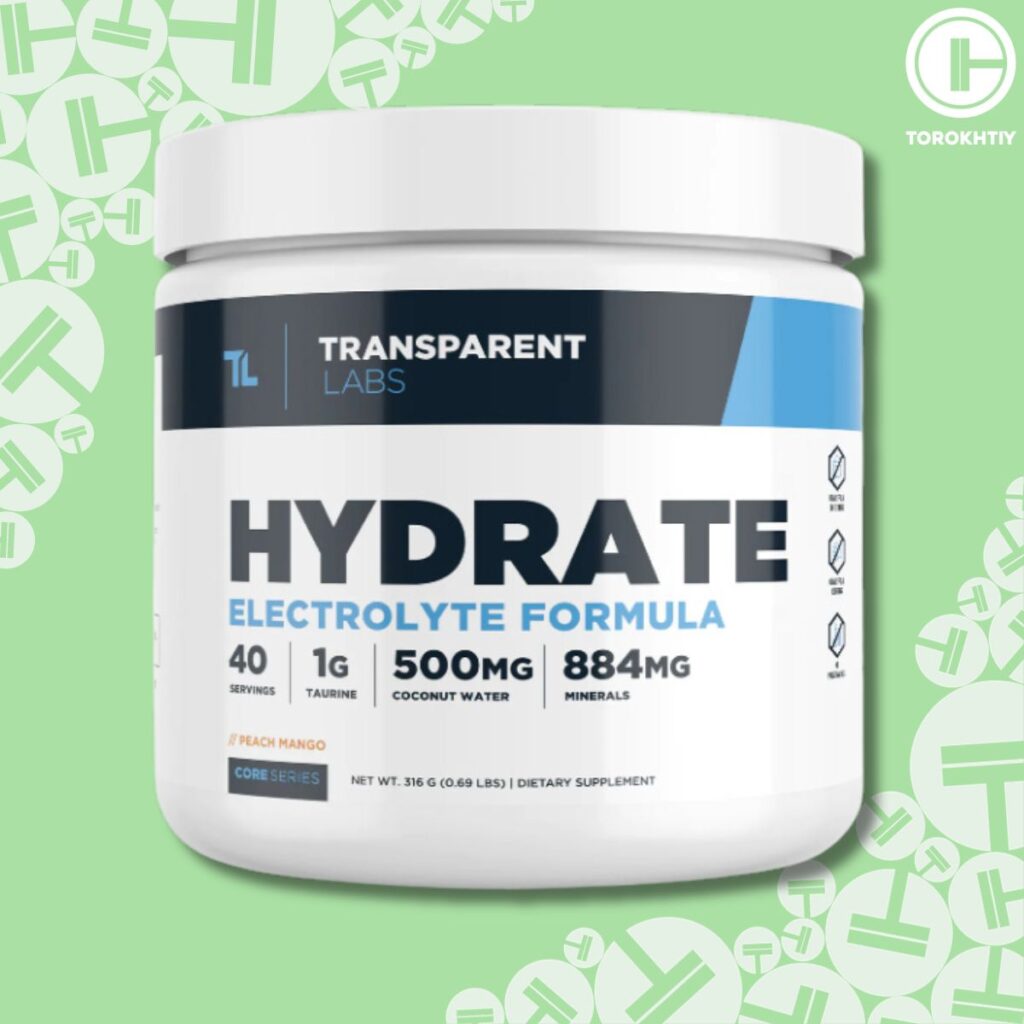
Still have questions after reading our article? Unlock your full potential by engaging with our experts and community! Don’t hesitate — leave a comment below and Camila Parente Santos will provide a personalized answer and insights to help you reach your goals.